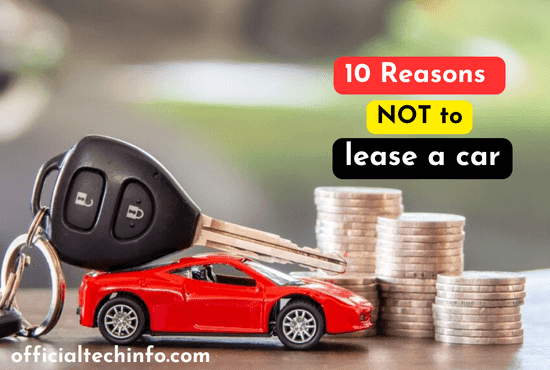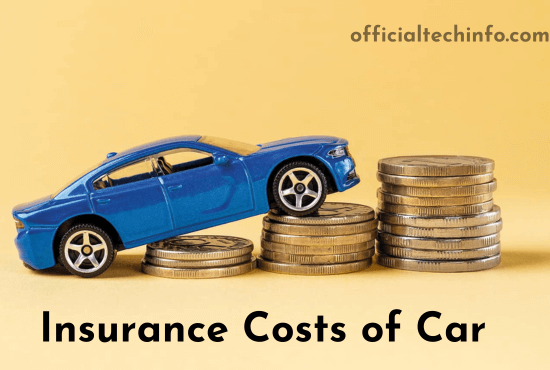10 Reasons NOT to lease a car
Here are the top 10 Reasons NOT to lease a car, Because this is my personal opinion. I will help a customer get a lease if they are determined but they will probably have to convince me a lot because I usually try to talk people out of leasing a car.
leasing can be a good idea with lower monthly payments and the chance to drive a new car every year. But I don’t think leasing is the best option for most people.
For business owners, I have various thoughts about leasing a car because there may be tax benefits to leasing. So it’s up to your choice I will give you all the info you need to know in case you decide to lease a car or not.
Many people do not want to change their car because they are happy with their car so they want to know about Can You Extend a Car Lease? Pros & Cons.
How Do Car Leases Work?
One way to get behind the wheel for a limited time is to lease a car. You “rent” the car from the leasing company, which buys it from the dealership.
The procedure is more affordable than purchasing a new car in terms of both the initial investment and the ongoing payments.
Leasing a car typically has a set duration, between two and four years. There are a few options when your lease is up: either take the vehicle back to the dealership, extend it, or buy it outright.
If you like leasing a car it is difficult to choose which is the best car for you so here is our complete research on the best car to lease in 2024 this research will help you to decide best option for you.
Is Leasing a Car Good Idea?
If you’re only planning to use your car for a year or two, leasing could be a smart choice—as long as you know the potential drawbacks.
Depending on the problems you face in the future, some of them might end up costing more than purchasing a new or used car.
1. High Long-Term Costs
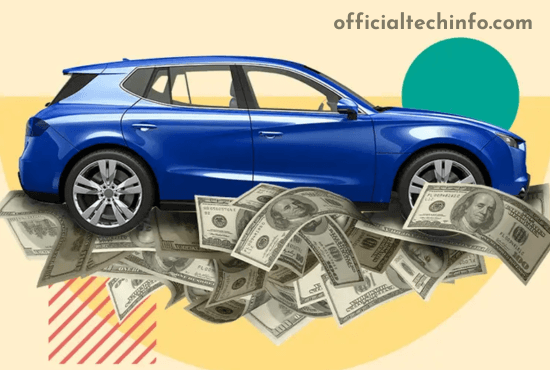
One of the most applicable reasons not to lease a car is the financial burden. The idea of reduced monthly payments may be appealing. But in the long run, buying a car may be cheaper than leasing one.
Combining mileage restrictions, possible fees, and depreciation contributes to this inflated cost.
The annual mileage limit is usually specified in the lease agreement. Significant fees may be applied after the lease period if these limits are exceeded.
Additionally, when returning a leased vehicle, you may be hit with a lot of wear and tear fees, even though the damage is minimal compared new purchased car.
The depreciation process is also a major contributor to the overall cost of leasing over time.
Leasing companies include the anticipated depreciation of the vehicle in your monthly payments, unlike when you own a car and it affects your eventual resale value. This implies that you’re essentially paying for the expected decline in value throughout the lease term.
You must understand that you are essentially paying for the car’s depreciation without getting any benefit from its possible long-term value.
Therefore, although leasing may seem like a better deal at first glance, the total cost can end up being more than if you bought the car outright due to factors like mileage penalties, possible fees, and the way depreciation is calculated.
2. Restrictions on Mileage
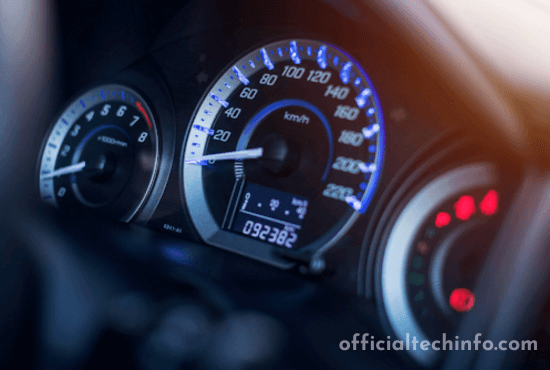
The amount of miles you are allowed to drive each year is specified in the lease agreement.
You should be prepared to pay additional mileage fees if you exceed your allocated limit during the lease term. Leasing companies often impose such mileage restrictions.
This might not be significant to someone who drives infrequently. However, the mileage limit could be an issue for you if you drive your vehicle to and from work every day.
3. Limited Customization Options

The freedom to personalize your vehicle is one perk of car ownership. Some examples of such modifications include adding window tinting, magnets, bumper stickers, or even tweaks that boost performance.
There are restrictions on personalization when you lease a vehicle. One example is the practice of tuning a vehicle to make it run better. Returning the vehicle to its original condition, with only the usual signs of wear and tear, is what the dealer anticipates.
4. Maintenance costs
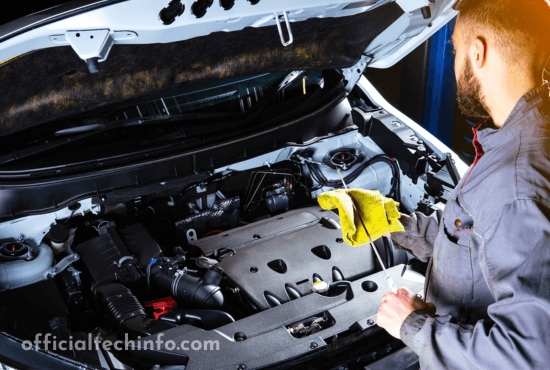
You take full responsibility for any repairs or maintenance that may be necessary when you lease a vehicle.
It is expected that the vehicle is returned in the identical state in which it was rented. You, and not the lessor, will be liable for any maintenance expenses incurred during the lease term.
There is some wiggle space for normal wear and tear, but you may be subject to extra fees and penalties if you return the vehicle with excessive wear when it’s time to trade it in.
5. No Ownership Equity
The idea of ownership equity is fundamentally different in car leasing compared to buying. You are effectively paying for the right to use a vehicle when you lease it. You will not be granted any legal claim to the asset.
This means that the leased vehicle will have no equity or value when the lease term ends.
On the other hand, paying off a loan to buy a car is a more gradual process. Over time, this helps build equity.
Your equity in the vehicle grows in proportion to the amount you pay down on the loan. After you pay off the loan, you’ll own the car completely. After that, it becomes an asset that you can use or sell whenever you want.
You can use the equity to your advantage, whether you plan to keep the car forever or trade it in for something else. Leases, in contrast, are more like renting the vehicle from the leasing company.
At the end of the lease term, you usually have the choice to either return the vehicle or buy it at a set price, which is called the residual value.
The equity you could have gained from the lease could be even more diminished if you decide to buy the car when the lease is up because the total cost might be more than the vehicle’s market value.
Leasing may allow you to get your hands on a new vehicle without making a long-term financial commitment, but it eliminates the security and financial advantages of owning your vehicle.
The purchase of a vehicle is like making a long-term investment in a valuable asset; it gives you the power to shape your financial future as you see fit.
6. Excessive Wear and Tear Charges
Lease agreements often contain mileage caps and additional fees for excessive wear and tear.
There may be fees associated with leasing a vehicle even if it has minor damage that wouldn’t be a problem if bought outright. Does it damage the paint? You’ll have to pay for that when you return it.
7. Duties at the End of the Lease
You are responsible for returning the leased vehicle to the dealership in the same condition as when you picked it up and for paying any applicable end-of-lease fees. More trouble and money could be yours if you don’t fulfill these commitments.
While leasing may seem like a good option at first glance, drivers should carefully consider the benefits and downsides before committing.
I hope that you will be able to make a well-informed decision that suits your needs and tastes after giving some thought to these ten arguments against leasing a car.
8. Insurance Costs
Insurance for a leased vehicle is typically more extensive than that for a purchased vehicle with financing. The total cost of leasing may rise as a consequence of increased insurance premiums.
This also applies to purchases. Finding out how much a new car will cost to insure is something you should do before you buy it.
The cost of insurance for your current vehicle might go up for specific models and years. You might end up spending more than planned and not realize it until you visit the accounting department if you aren’t prepared. Being there is not ideal. Conduct preliminary research.
9. Complex Agreements
It takes a careful reader with an eye for detail to make sense of the maze that is a leasing agreement. A lease agreement’s terms and conditions might contain a plethora of clauses, fees, and provisions that are easy to overlook or misunderstand.
Lessees may not fully understand the potential pitfalls and unexpected costs caused by this complexity until it’s too late. Leasing contracts are complex and detailed, which can be intimidating and lead to misunderstandings.
There is a lot of gray area and variation amongst leasing companies when it comes to factors like residual value calculation, excess mileage charges, wear and tear criteria, and early termination penalties.
Lessees may experience future frustrations due to the difficulty in making well-informed decisions caused by this lack of standardization.
The purchase of a vehicle, on the other hand, is usually a more straightforward affair. Car ownership is often more familiar and open to customers, compared to financing agreements, which can still be complex.
When compared to the complexities of leasing, understanding the terms of ownership, the structure of the loan, and the eventual payoff is usually more intuitive.
Leasing agreements should be approached with a critical mindset and a readiness to ask questions. To protect yourself from unanticipated fees or misunderstandings, it is crucial to read the small print, ask questions, and fully grasp the terms.
If the thought of deciphering intricate contracts fills you with dread, perhaps the simple road to vehicle ownership will ease your anxiety.
10. Lack of Flexibility in Lifestyle
For the duration of the lease, which is usually two or three years, you are bound to the conditions outlined in the contract.
A lease that doesn’t work for you or your family can be a real pain in the neck when life throws a wrench in your plans, like when you get a new job, have a baby, get hurt, or get married.
When is leasing worth it?
Even though there are a lot of reasons not to lease a car, you might still be considering it. After all, nearly 20% of American drivers still have the option to lease. Leasing a car might be appealing if you think of it more as a cost than an investment.
So long as that’s the case, you won’t have to worry about actually owning the product you’re paying for. After all, some people choose to rent throughout their lives instead of buying a property.
A car lease might be smart for some sole proprietors or small company owners because the payments can be written off as business expenses.
A lot of people think about leasing, but after they weigh the pros and cons, they decide that buying or subscribing would be better.
What should you do if you already have a lease?
Never lease a car without first answering these important questions about car leasing. On the other hand, if you’re already in a lease, it might be costly to switch to a different option due to the high break fees.
When your current lease is about to expire, it’s a good time to look over your options once again.
Leasing vs buying a car
Pros and Cons of Leasing a Car
Pros
- Lower monthly payments
- Ability to drive new models regularly
- Minimal maintenance hassles
- Lower initial down payment
Cons
- Limited mileage allowance
- No ownership at the end of the lease
- Costly penalties for exceeding mileage or damages
- Continuous payments without asset ownership
Pros and Cons of buying a Car
Pros
- Ownership rights after payments
- No mileage restrictions
- Freedom to customize and modify the car
- No penalties for wear and tear
Cons
- Higher initial costs
- Depreciation affects resale value
- Responsible for maintenance costs
- It may require a larger down payment
Related Articles
Conclusion
- When considering leasing, it is essential to consider the long-term implications, even though leasing may provide short-term benefits such as lower monthly payments and access to newer vehicles.
- Think about the high maintenance costs, restricted mileage, few personalization choices, possible fines, and the absence of ownership equity.
- Think about your long-term financial plans and how they relate to your current way of life before signing a lease.
FAQs
Why you shouldn’t lease a car?
Leasing a car has the apparent drawback of not being able to own the vehicle when the lease is over. So, if you’re planning to buy a car, you won’t be able to trade it in.
Customers who frequently lease vehicles for an extended period may wind up spending more money than they would have if they had purchased the vehicle outright.
Is leasing a car a good idea UK?
Repair and maintenance expenses are likely to be lower with a leased vehicle than with an outright owned vehicle because many leased cars are covered by warranties for the duration of the lease.
In addition, you may be able to avoid paying for the vehicle’s MOT if it is less than three years old, and the leasing company may even pay for the road tax.
Can I end a car lease early?
Yes, but it often involves significant fees. Check your lease agreement for details on early termination penalties.
Can I negotiate the terms of a car lease?
Yes, negotiating lease terms is possible. Be prepared to discuss factors like mileage limits, monthly payments, and lease duration.
Is leasing a car better for short-term or long-term use?
Leasing is generally more suitable for short-term use due to its lower initial costs, but long-term leasing can result in higher overall expenses.
Can I buy a leased car before the lease ends?
Yes, you can usually buy out your leased vehicle before the lease term expires. However, consider the total cost and compare it to purchasing a new or used car.
Are there any tax benefits to leasing a car?
Sometimes, leasing a car for business can offer tax advantages. Consult with a tax professional to understand your specific situation.
Leasing a car can be enticing, but it’s crucial to look beyond the initial allure. Consider your long-term financial goals, lifestyle needs, and alternatives before making a decision that could impact you for years to come.
